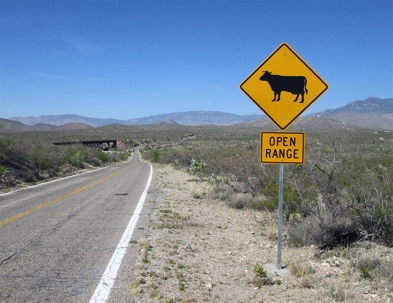Every year, there are a large amount of car crashes that result in injuries. While most crashes involve other motor vehicles, there is a surprising number of accidents that involve animals, especially in Texas. A collision with an animal can cause extensive damage to a car, severe injuries to the passengers, and in some cases, death. Now the important question is, who is responsible when a person is injured or killed in an animal-related crash? The answer is more complicated than you may think.
Texas Livestock Laws
The state of Texas has several laws in place governing the liability of crashes that pertain to animals. The state is generally considered to be “open range” but some parts of the state are “closed range,” and these vary by county. If a county has not made a formal decision or held an election on the matter, the open range law automatically applies.
What Is Open Range Law?
Open range means that property owners do not need to fence in their livestock. However, even in open-range counties, livestock are not permitted to roam unattended on or along federal or state highways. “Closed range” means that all livestock owners are required to fence in their animals. Thus, depending on where a crash with livestock occurs, determining whether the county is open range or closed range will generally dictate whether or not the livestock owner is liable for the crash and the damages and injuries that result from the crash.
For example:
If the accident occurred on a non-state or non-federal road (i.e., a Farm to Market or FM road), and the county did not have a specific stock law in place, the open range law would apply. Therefore, the livestock owner would not be held liable for damages. In this case, you would need to go through your insurance to recover damages and hope you have collision coverage.
If the accident occurred on a non-state or non-federal road, and the county did have closed range stock laws in place, there may be a case for liability. Stock laws differ between counties, but they generally require livestock owners to fence in their animals. Usually, the owner may be held liable if he or she permitted the animal to roam free or negligently allowed the animal to escape.
Proving that the animal or livestock owner was negligent can be difficult, however. We look for a history of calls to the police or sheriff’s office complaining of the owner’s loose animals on the roadway. We look too at the livestock owner’s fences and gates to see whether they have been properly maintained. We talk to neighbors and law enforcement to see if there is a history of the livestock owner’s animals escaping from the pasture.
The animal owner may be held liable if the accident occurred on a federal or state highway. But we generally have to show that the livestock owner knowingly permitted the animal to roam on the roadway. Can it be shown that the livestock owner knew a fence was down or a gate was broken but failed to fix or repair it? The owner could be held liable in this instance whether or not stock laws are in place in that particular county.
Brazos County Livestock Laws
Unfortunately, and for reasons we cannot explain, Brazos County does not have stock laws, meaning that open range law automatically applies to crashes with livestock that occur in Brazos County. Because of this, if an animal-related crash happens on a non-state or non-federal road, the livestock owner will not be held liable. An exception to the open range rule pertains to federal and state highways. Under the terms of the law, an animal owner is not permitted to “knowingly” allow specific animals to roam freely and unattended along a highway. This means that all U.S. and state highways are “closed range” under Texas law. This can cause confusion, as two intersecting roadways in one county may fall under different areas of the law. Under the terms of the statute, liability for a resulting car accident falls upon either the person who owns the animals or the person responsible for the control of those animals.

